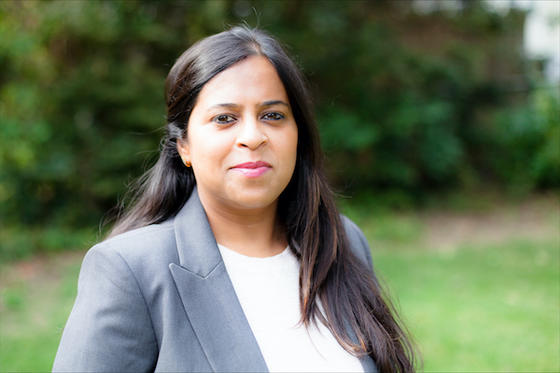George Mason University graduate student Archana Vardhan was one of 20 students nationwide selected for a summer fellowship through the Association of Maternal and Child Health Programs (AMCHP) called the Graduate Student Epidemiology Program. Her area of expertise is the mental and physical health of postnatal mothers of color.
“There have been research studies on prenatal mothers, but not much data is available for postnatal mothers,” said Vardhan, who is working on a master of public health degree in the College of Public Health. “I look at the challenges [Black and African mothers] face—discrimination and other barriers—and what education models can be provided to them for their optimum health and mental peace.”
Vardhan, who is also a mother to two small children, said the education models created for the postnatal mothers will include how they can take care of themselves after delivery, what herbal remedies can be used in addition to the treatment if they have any medical problems, and how they can advocate for themselves.
In addition to her graduate studies, Vardhan, who is originally from India and came to Virginia in 2013, works full-time as a clinical research specialist at Inova Health System.

For her fellowship, she was assigned to work with a health department in Portland, Oregon, where her role included developing a survey about maternal well-being and designing an education program.
“We built a questionnaire, which had a very good response from [around] 110 mothers. Then we did a qualitative analysis. My role was to design the survey and do the qualitative analysis and build an education model on whatever results I get from the survey,” she explained.
Vardhan also enrolled in the summer Global and Community Health (GCH) course GCH 609: Community Assessment and Partnership with assistant professor Marybeth Mitcham, where the coursework perfectly aligned with the responsibilities of her fellowship, she said.
“This course covers what I consider to be some of the most important factors in conducting any community work,” said Mitcham, “[including] the value of involving community members in every step of community work and using an interdisciplinary strategy to address problems.”
The course explores needs assessments, crafting effective surveys, focus group questions, and more, using examples of actual community work, said Mitcham, who is also director of the online MPH program.
Mitcham aims to incorporate students' interests in the classroom so that they can explore topics that are relevant to them. For GCH 609, Vardhan used her research from her summer fellowship and her work at Inova as the basis for her assignments.
“One of my favorite things about [the college] is that students are supported not just in their education and research, but in exploring potential solutions to problems about which they care,” said Mitcham. “Archana is fabulous, and I can't wait to see the amazing positive changes that will occur to the holistic health of postnatal mothers of color as a result of Archana's drive, passion, and excellence.”
Although her fellowship has ended, Vardhan still does volunteer work with AMCHP and is in constant contact with her site supervisor. AMCHP also has a program called Healthy Birth Initiatives that will benefit from Vardhan’s work.
“In the end, it is the mother who is taking care of the baby, so now after giving birth they can be taken care of too. The biggest takeaway is that postnatal care for Black mothers should be culturally sensitive, inclusive, and tailored to address the unique challenges they face,” said Vardhan.
“By focusing on these key areas, health care providers and policymakers can work toward improving the health and well-being of Black mothers and their babies. Mothers are dealing with a huge crisis in terms of emotional [health], especially mothers of color,” she said.
Related News
- April 23, 2024
- April 15, 2024
- April 9, 2024
- March 5, 2024
- February 5, 2024
